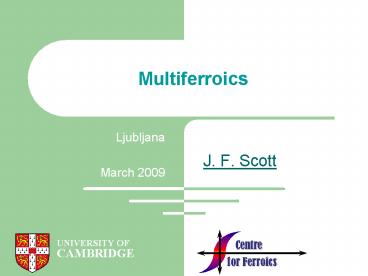Multiferroics PowerPoint PPT Presentation
1 / 36
Title: Multiferroics
1
Multiferroics
- J. F. Scott
Ljubljana March 2009
Centre
for Ferroics
2
Outline
- High temperature phases of BiFeO3
- R. Palai, R. S. Katiyar, H. Schmid, J. Robertson,
S. A. T. Redfern, X. Lou - Fluoride ferrimagnets
- R. Blinc et al.
- Magnetoelectric multilayer capacitors
- C. Israel, N. Mathur, J. F. Scott
3
Multiferroics
1.0 ?m
a
4
Multiferroic oxides
M. Bibes (unpublished)
5
Phase diagram of BiFeO3
H. Schmid (1986) E. I. Speranskaya (1965)
6
Schematic phase diagram
7
DTA data
R. Palai et al. condmat (2007)
8
X-ray data
R. Palai et al. PRB 77, 014110 (2007)
9
Phase boundary
10
Domain in BiFeO3
11
Metal-insulator transition
12
Resistivity of BiFeO3
13
Band structure (orthorhombic)
J. Robertson (2007)
14
Band structure (cubic)
J. Robertson (2007)
15
Is the ß-phase monoclinic?
- Yes, see paper by Dkhil and Kreisel this week
- No
- No monoclinic domain walls are seen
- Violates principle of maximal subgroup for 2nd
order transitions
16
Spin reorientation and magnons in BiFeO3
17
Magnons in BiFeO3
18
Magnons in BiFeO3
Intensity (a.u.)
?(cm-1)
T (K)
19
MAGNETOELASTIC EFFECTS
S A Redfern
20
ELASTIC ANOMALIES
21
DIELECTRIC DATA ON SINGLE-XTAL BiF
G. CATALAN
J. HONG
22
FIELD-COOLED AND ZERO-FIELD_COOLED DC
MAGNETIZATION
Singh and Katiyar
M (10-4 emu/g)
T (K)
23
Multilayer capacitors
The market for MLCs is gt 109/year This means
1012 capacitors made per year - You probably
already own several thousand of those!
24
K3Fe5Fe15
Weak Ferromagnetism and Ferroelectricity in
K3Fe5F15 Robert BLINC1, Gaper Tavcar1, Boris
emva1, Darko Hanel1, Zvonko Jaglicic2, Zvonko
Trontelj2, Pavle Cevc1, Cene Filipic1, Adrijan
Levstik1, N. Dalal3, N. Ramachandran3, and J.
Krzystek3, James F. Scott4 1J. Stefan Institute,
Ljubljana, Slovenia 2Institute of Mathematics,
Physics and Mechanics, Ljubljana,
Slovenia 3Florida State University, Tallahassee,
Florida, USA 4University of Cambridge,
Cambridge, UK Abstract Here we report on the
observation of a weak ferromagnetic transition at
TN 123 K in a K3Fe5F15 system which is
ferroelectric and ferroelastic below Tc 490 K.
The magnetization continuously increases with
decreasing T down to 6 K. Mössbauer spectra show
a spontaneous magnetic ordering and at least
three sites corresponding to Fe2 and Fe3. The
ratio between Fe2 and Fe3 is 60 40. At 6 K
there are two magnetically ordered sextets with
internal fields of 585 kOe and 263 kOe. At 122 K
and at low frequencies the system shows
dielectric anomalies characteristic of
magnetoelectric behaviour.
25
Dielectric and magnetic response
26
Dielectric loss
27
Conclusions
- Metal-insulator phase transition in BiFeO3
confirms the Mössbauer study of H. K. Mao et al.
(JETP Letters 2005) - Spin reorientation at 140 K and 200K in BiFeO3
other anomalies at 53K and 240K - One cent room temperature magnetoelectric
detectors - Ferrimagnetic fluoride multiferroic at 123 K
28
Magnetic hysteresis
29
X-ray diffraction
30
Dielectric constant
31
Ferroelectric hysteresis
32
(No Transcript)
33
Magnetodielectric effect
34
Cole-cole plots
35
Magnetoelectric freezing
36
Magnetoelectric freezing

